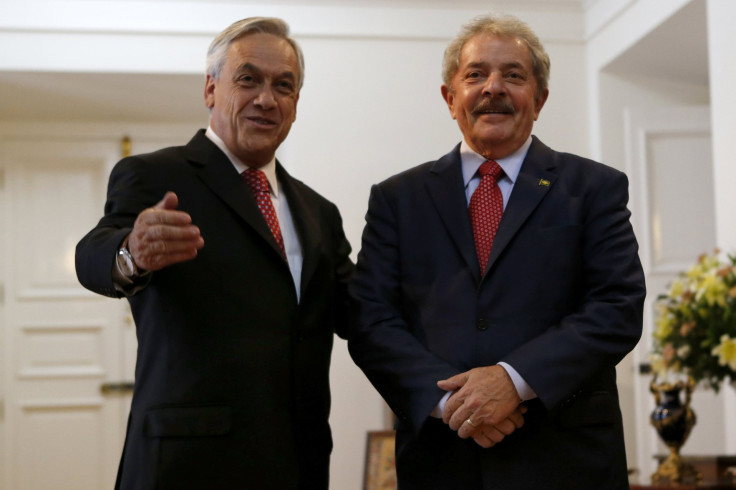How A Celebrity Can Help You Quit Smoking: Stars' Public Diagnoses Promote Cancer Screening And Prevention

With New Year’s quickly approaching, health resolutions, such as eating healthier, losing weight, and quitting smoke rank high on people’s lists. While the start of a new year looks like a promising way to start off on a clean slate by quitting bad habits, it may not be as much of a powerful motivator as the motivation of a celebrity. Stars’ publicly announced cancer diagnoses are more likely to heavily influence more smokers to consider quitting than New Year’s or World No Tobacco Day, according to a recent study.
Based on the Centers for Disease Control and Prevention (CDC) latest statistics, 19 percent of American adults were current smokers in 2011 with approximately 69 percent wanting to quit completely. The difficulties that lie within kicking the habit are due to nicotine, the chemical in cigarettes that makes the smoker addicted to smoking. A cigarette contains about 2 milligrams of nicotine. Those who smoke a pack-a-day experience 250 hits of nicotine to his or her brain each day, according to the National Institute on Drug Abuse. When the body is used to having nicotine, quitting smoking may cause feelings of uneasiness since the body isn’t getting the chemical anymore. However, those who want to kick the habit may feel more of an incentive to do so when they see a celebrity do so, too.
Published in the journal Preventative Medicine, a team of researchers from San Diego State University, the Santa Fe Institute, the University of North Carolina, and the Johns Hopkins Bloomberg School of Public Health investigated whether celebrity cancer diagnoses promote primary cancer prevention by observing media trends following the 2011 announcement of former Brazilian President and smoker Lula da Silva's laryngeal cancer diagnosis. Public health experts are aware celebrity cancer discussions often prompt others to get screened for cancer or consider the same treatments.
Daily trends for smoking cessation-related media and Google queries around former President Lula da Silva's laryngeal cancer diagnosis announcements were compared to a typical period and other cessation awareness events in Brazil.
The findings revealed news coverage of quitting smoking increased as much as 500 percent immediately after former President da Silva’s diagnosis. The following week coverage remained at 163 percent higher than usual before it returned to typical levels in the third week. Similarly, Brazilian Google searches related to quitting smoking increased by 67 percent.
The authors note even after the media stopped covering former President da Silva’s diagnosis, Google smoking-cessation-related searches still remained 153 percent higher than expected and remained 130 percent and 71 percent higher three and four weeks, respectively.
The tragic cancer diagnosis became the greatest smoking cessation-promoting event in Brazilian history, the researcher said in the press release. "Interest in quitting smoking, as indicated by Google searches, reached its highest recorded level after Lula's diagnosis, even when compared to traditional cessation awareness events such as New Year's Day or World No Tobacco Day,” said John W. Ayers, lead researcher of the study and research professor at San Diego State University.
The benefits of quitting smoking do not just lend themselves to prevent throat cancer but it’s effective in preventing other cancers. “In practical terms, we estimated there were about 1.1 million more quit-smoking queries in Brazil the month after Lula's diagnosis than expected. Not only will quitting prevent throat cancer, but it can prevent nearly all cancers, including lung, stomach, breast, etc.,” said Benjamin Althouse, study coauthor and Santa Fe Institute epidemiologist.
Following former President da Silva’s cancer diagnosis, Brazil became the largest smoke-free nation in the world with a population of more than 191 million. In December 2011, now President Dilma Rousseff, signed a law banning smoking in all enclosed public spaces in the country. The federal law requires graphic warnings to cover the entire back of a cigarette pack but no warning in the front.
These findings highlight the power celebrity cancer diagnoses have in teaching the public about cancer prevention and screenings. The public is more receptive to messages about cancer when a celebrity is affected and covered by the media. This can provide better leverage for quitting smoking advocates to promote healthier behaviors and prevent future cancers, believe the researchers.
In the U.S., President Barack Obama announced in September he quit smoking years ago. “I haven’t had a cigarette in probably six years. That’s because I’m scared of my wife,” he said. Obama has previously been open about his struggle to quit for years and has even admitted to using Nicorette gum to help stop smoking.
To learn how other celebrities have stop smoking, click here.
Source: Ayers JW, Althouse BM, Cohen JE et al. Do celebrity cancer diagnoses promote primary cancer prevention? Preventative Medicine. 2013.



























